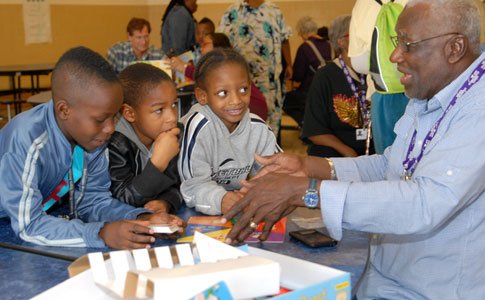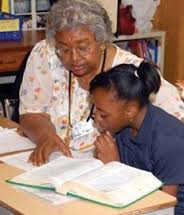For Older Adults, Participating in Social Service Activities Can Improve Brain Functions
Volunteer service, such as tutoring children, can help older adults delay or reverse declining brain function, according to a study led by researchers at the Johns Hopkins Bloomberg School of Public Health. Using functional magnetic resonance imaging (fMRI), the researchers found that seniors participating in a youth mentoring program made gains in key brain regions that support cognitive abilities important to planning and organizing one’s daily life. The study is the first of its kind to demonstrate that valuable social service programs, such as Experience Corps—a program designed to both benefit children and older adults’ health—can have the added benefits of improving the cognitive abilities of older adults, enhancing their quality of life. The study is published in the December issue of the Journals of Gerontology: Medical Sciences.
About 78 million Americans were born from 1946 to 1964. Individuals of retirement age are the fastest-growing sector of the U.S. population, so there is great interest in preserving their cognitive and physical abilities, especially given the societal cost of the alternative.
"We found that participating in Experience Corps resulted in improvements in cognitive functioning and this was associated with significant changes in brain activation patterns,” said lead investigator Michelle C. Carlson, PhD, associate professor in the Bloomberg School’s Department of Mental Health and Center on Aging and Health. “Essentially the intervention improved brain and cognitive function in these older adults."
The study is the first of its kind to examine the effect of Experience Corps, a national volunteer service program that trains seniors to help children in urban public schools with reading and academic success in other areas. The study followed 17 women aged 65 and older. Half participated in existing Experience Corps programs in Baltimore schools, while the other half were wait-listed to enroll in Experience Corps the following year. Participants were evaluated at enrollment and again six months later, which included fMRI brain scans and cognitive function testing.
“While the results of this study are preliminary, they hold promise for enhancing and maintaining brain reserve in later life, particularly among sedentary individuals who may benefit most urgently from behavioral interventions like Experience Corps,” said Carlson, who is now leading a larger fMRI trial as part of a large-scale randomized trial of the Baltimore Experience Corps Program.
“As life expectancies increase, it’s important, from a public health standpoint, to delay the onset of diseases associated with aging,” said senior author Linda P. Fried, MD, MPH, dean of the Mailman School of Public Health at Columbia University. “This study suggests that new kinds of roles for older adults in our aging society can be designed as a win-win—for addressing important societal needs, such as our children’s success, and simultaneously the health and well-being of the older volunteers themselves.”
Additional authors of “Evidence For Neurocognitive Plasticity In At-risk Older Adults: The Experience Corps Program” include Kirk I. Erickson, University of Pittsburgh; Arthur F. Kramer and Michelle W. Voss, University of Illinois at Urbana-Champaign; Sylvia McGill, The Greater Homewood Community Corporation, Baltimore, Md.; Teresa Seeman, University of California, Los Angeles; and Natalie Bolea, George W. Rebok and Michelle Mielke, Johns Hopkins University.
The research was co-funded by a Research and Career Development award to Dr. Carlson from the Johns Hopkins Claude D. Pepper Center and by a gift from S.D. Bechtel.
Public Affairs media contact: Tim Parsons at 410-955-7619 or tmparson@jhsph.edu.
Additional media contact: Sabrina Strauss, for Columbia University, 212-576-2700 x236 or sstrauss@goodmanmedia.com.
Source: https://www.jhsph.edu/news/news-releases/2009/carlson-brain-scan.html
Your Comments / Reviews
© Copyright 2026 Sarm’s Occupational Therapy and Rehabilitation Centre







